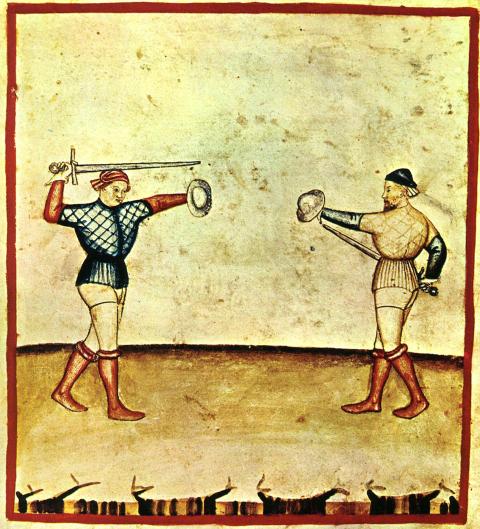Chinese practice
以子之矛,攻子之盾
to pierce your shield with your own spear

Photo: Wikimedia Commons
照片:維基共享資源
(yi2 zi3 zhi1 mao2 gong1 zi3 zhi1 dun4)
著名的戰國時期哲學書《韓非子》中的一章〈難一〉,有則故事說,有個楚國人在市場叫賣,卻被人發現他所說的話互相牴觸。
故事說道,這楚國人在叫賣長矛和盾牌。他拿起所賣的一面盾,向眾人喊道:「我這面盾非常堅固,沒有任何東西可以穿得透」;他再舉起一支長矛喊道:「我這支矛非常鋒利,沒有什麼東西是刺不穿的。」人群中便有人問道:「以子之矛攻子之盾,何如?」(如果用你賣的矛來刺你的盾,那會怎麼樣?)真正難以穿透的盾牌,和可刺穿任何東西的長矛,是不可能同時存在的。
這賣家吹噓他賣的東西品質有多好,但卻「hoist on his own petard」(升起自己的炸藥箱、作法自斃),而且「shot himself in his own foot」(朝自己的腳開槍、搬石頭砸自己的腳)。
「以子之矛,攻子之盾」這句話,現在用來表示將某人自己的論點轉過來對付他們;也就是說,利用他們自己所打造的機制,以其論證中的矛盾或弱點來打敗他們。現今常用的「矛盾」一詞,以及成語「自相矛盾」,也是源於這個故事。
「petard」(攻城炸藥箱)這個字,現今已不常使用,因為它是一種早已過時的戰爭武器,就像長矛和盾牌一樣。「petard」是一種小容器──原為金屬製、呈鐘形,後來做成木箱──裡面裝滿炸藥,用來貼在牆壁和門上,以便將爆炸的力量引到牆或門上,將其炸開。十六世紀時,「petard」常見於歐洲的戰爭。莎士比亞一六○二年的劇作《哈姆雷特》便提到了它:
For tis the sport to have the enginer
Hoist with his owne petar.
(見到一個砲手被自己的砲轟,倒也是挺有趣的。)
其中「enginer」一字是「engineer」(工程師)當時的另一種拼法,指的是軍備製造者。
就像那個自吹自擂的戰國賣家陷入那古老的矛盾,或像那倒霉的中世紀歐洲工程師被他自己製造的爆裂物所炸飛,「hoist on your own petard」現在是用來指自己給自己構設(engineering)了不幸的景況。
再繼續這軍事主題,「shoot yourself in the foot」(射擊自己的腳)顯然是源於第一次世界大戰時的一種做法──士兵選擇傷害自己,其傷不足以致命,但會減損被送上戰場的價值──其中一個辦法便是用槍射自己的腳。這就是去犧牲相對無關緊要的事物,以獲得更有價值的東西,也就是更大的生存機會。
現今「shoot yourself in the foot」這成語是比喻不明智地造成自我傷害──可能是由於笨拙或愚蠢。或許因為如此,也有人認為此語另有出處:美國西部荒野的牛仔在槍戰中急於拔槍,卻不小心擊發還在槍套裡的槍,往自己的腳下射擊。
(台北時報林俐凱譯)
假消息的散布,是利用民主制度的自由來反民主,以子之矛攻子之盾。
(The dissemination of fake news is exploiting the freedoms in a democratic system, to effectively hoist democracy on its own petard.)
英文練習
hoist on your own petard
shoot yourself in the foot
In the nan yi chapter of the influential Warring States period philosophical work the han feizi there appears an anecdote of a market seller in the state of Chu caught in a contradiction.
According to the story, there was a man of Chu selling spears and shields. Holding up one of his shields, he called out to the crowd: “My shields are so strong, there is nothing that can penetrate them”; holding up one of his spears, he called out, “my spears are so sharp, there is nothing they cannot pierce.” Someone in the crowd asked, 以子之矛陷子之盾,何如: What if one were to attempt to pierce the shield with the spear? It is impossible for a truly impenetrable shield and a spear that can pierce anything to exist at the same time.
The seller was hoist on his own petard; he had shot himself in his own foot with his boasts of the quality of his wares.
The phrase 以子之矛,攻子之盾 is now used to mean turning someone’s own argument back on them; that is, exploiting contradictions or weaknesses in another’s theory or argument to defeat them with a device of their own making. The word 矛盾 (contradiction/ contradictory) and the phrase 自相矛盾 (to contradict oneself) originate from this same passage.
The word “petard” is no longer in general usage, as it is a weapon of warfare long obsolete, much as spears and shields are. It once referred to a small enclosure — originally metallic and bell-shaped, later a wooden box — that would have been attached to walls and doors and filled with explosives, to direct the force of the blast to the wall or door and thus breach it. In the 16th century, the petard was common in European warfare. William Shakespeare mentions it in his 1602 play Hamlet, in which appears the line:
For tis the sport to have the enginer
Hoist with his owne petar.
Here, “enginer” is a contemporary alternative spelling of “engineer,” which at the time would have referred to makers of military devices and machines.
Like the boastful Warring States seller caught in an ancient contradiction or the hapless medieval European engineer blown up by the explosive in the device he himself had constructed, to be “hoist on your own petard” has come to mean “engineering” the conditions of your own misfortune.
To continue the military theme, to “shoot yourself in the foot” apparently comes from a practice in World War I in which soldiers would prefer to wound themselves in such a way that would not be life threatening but would also discount themselves from being sent into battle. One such way was to shoot themselves in the foot. If the story is true, it would mean sacrificing something relatively inconsequential in the interest of gaining something of more value: a greater chance of survival.
As an idiom, it has come to mean ill-advisably causing a self-inflicted wound, figuratively — not literally — speaking, sometimes through one’s clumsiness or stupidity. Perhaps for this reason it is often given an alternative origin: of cowboys in the American Wild West inadvertently discharging their guns in their holsters — and thereby shooting themselves in their own foot — in the rush to draw their weapon during a gunfight.
(Paul Cooper, Taipei Times)
If he wanted to ingratiate himself with the boss by telling him Kate was late, then he’s shot himself in the foot. The boss hates snitches.
(如果他跟老闆說凱特遲到了,想藉此討好老闆,他就是搬石頭砸自己的腳,因為老闆最討厭人家打小報告了。)

Thailand and Cambodia are engaged in their worst fighting in over a decade, exchanging heavy artillery fire across their disputed border, with at least 30 people killed and tens of thousands displaced. Tensions began rising between the Southeast Asian neighbors in May, following the killing of a Cambodian soldier during a brief exchange of gunfire, and have steadily escalated since, triggering diplomatic spats and now, armed clashes. WHERE DOES THE DISPUTE ORIGINATE? Thailand and Cambodia have for more than a century contested sovereignty at various undemarcated points along their 817km land border, which was first mapped by France in 1907 when Cambodia was

Alan Turing, celebrated as the “father of computer science,” was a brilliant mathematician and scientist. Born in London in 1912, Turing showed exceptional talent in mathematics and science from a young age. At 16, he understood Albert Einstein’s work without difficulty. This intelligence carried him through studies at Cambridge University and later at Princeton University in the US, where he further explored complex mathematical theories. In 1936, Turing introduced the concept of the Turing machine, a theoretical device for solving mathematical problems. He described it as having an infinite tape on which symbols could be read, interpreted, and modified. With simple

A: After touring Taipei, the play Life of Pi is now heading to Taichung. You wanna go? B: Did you forget? We’re going to Taipei this weekend to see the musical Sunset Boulevard and go to Japanese pop diva Ayumi Hamasaki’s concert. A: Oh yeah, that’s right. The classic composed by Andrew Lloyd Webber is touring Taiwan for the first time. B: I heard that it’s adapted from a 1950 film with the same title. A: And the show will feature legendary soprano Sarah Brightman, who is finally returning to the musical stage after 30 years. We can’t miss it. A: 在台北巡演後,戲劇《少年Pi的奇幻漂流》本週起將移師台中。要去嗎?

A: Apart from the musical Sunset Boulevard, Japanese pop diva Ayumi Hamasaki is also touring Taiwan after a 17-year wait. She’s holding two concerts starting tonight. B: Ayu has the most No. 1 hits of any Japanese solo artist, with 33 total. A: “Time” magazine even crowned her as “The Empress of Pop.” B: She staged shows in Taipei back in 2007 and 2008, causing an “Ayu fever” across Taiwan. A: Unfortunately, the singer has been deaf in her left ear since 2008, and is gradually losing hearing in her right ear. I’m so excited to see her singing in Taipei again. A: 除了音樂劇《日落大道》,日本歌后濱崎步睽違17年,今晚起在台北熱唱兩場。